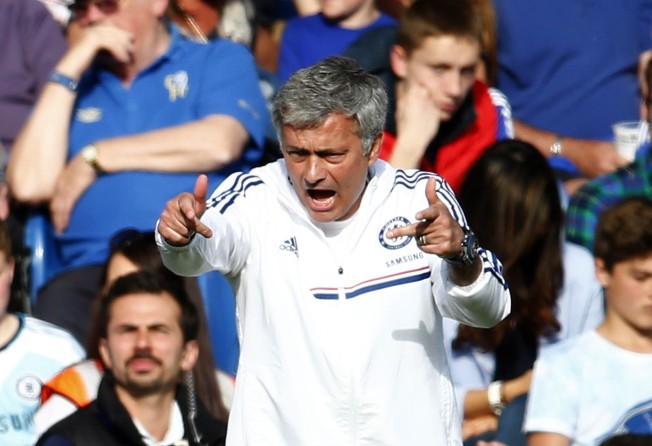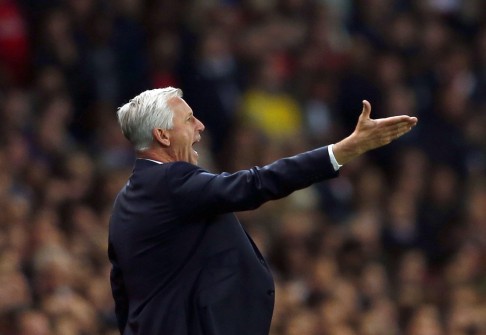Why pointless fines from FA send message that abusing refs is OK
No wonder the likes of Jose Mourinho and Alan Pardew continue to blast officials when there is no genuine disincentive for them not to do so

It is painfully obvious that competition organisers like the FA have no clue whatsoever in punishing offenders. The feeble fines and suspensions meted out in soccer make a mockery of the whole disciplinary system. They also offer a glimpse of our societal values that help shape what is considered unacceptable behaviour.
Chelsea manager Jose Mourinho and Newcastle United coach Alan Pardew are two examples of serial offenders who abuse match officials. Although the disciplinary sanctions handed down to them are consistently too little too late, the social messages are nevertheless fascinating and meaningful.
Mourinho is contesting the FA's charge of misconduct in the fallout of his side's loss to Sunderland, which ended his record-breaking non-losing home streak of 77 matches. Since Mourinho is evidently guilty, his frivolous appeal only serves to delay the charge's conclusion. Also, Mourinho has already been sent from the technical area twice this season and received fines of £8,000 (HK$105,000) apiece.
Pardew has just finished serving a seven-match ban, three of which barred him from the stadium. The FA also fined him £60,000. But this level of seriousness was based on the fact that Pardew attempted to headbutt a player, rather than for an altercation with a match official. When Pardew shoved a linesman last season, the FA only penalised him with a two-match touchline ban and £20,000.
Furthermore, managers brazenly ignore the FA's punishments and simply circumvent touchline bans by using mobile phones to communicate with their teams while banned.
The lesson from cricket, where England captain Stuart Broad recently received a fine equivalent to 15 per cent of his match fees for criticising the umpire, makes slightly more sense. Assuming EPL managers receive £100,000 per week, this would mean Mourinho being initially fined £15,000 (instead of £8,000).
Even this pales in comparison to what clubs dish out to misbehaving players. For example, both Manchester City and Queens Park Rangers did not hesitate in fining Carlos Tevez and Joey Barton respectively six weeks' wages for gross misconduct.
The failure to effectively discipline offenders encourages others to believe that delinquent behaviour, specifically towards match officials, is acceptable at all levels of the game.
In England, Oksana Karaliova, 34, and her husband Lazaro Garcia, 44, were recently convicted of common assault. The woman spat twice into the face of a 16-year-old referee, and the man grabbed the young match official by the throat. All this after an under-9s match. Soccer authorities and leagues everywhere must take some responsibility for this state of affairs and toughen up their sanctions.

If ever there was a bold and decisive disciplinary statement made within the sporting world, it is the NBA's lifetime ban handed to Los Angeles Clippers owner Donald Sterling plus a US$2.5 million fine for his racist remarks. NBA commissioner Adam Silver received overwhelming praise for his zero tolerance approach to racism.
However, to understand Silver's commendation, we must appreciate that in the US there is an underlying societal sensitivity towards racism, which is mainly rooted in the slavery past of African-Americans. The current societal values towards racism in the US are set extremely high, and therefore explain why Silver had no problem receiving widespread support and acclaim for his sanctions.
This societal sensitivity towards racism does not appear to be set similarly high in Europe, with many leagues criticised for not doing enough to stamp out racism and other forms of discrimination in soccer. The Spanish Football Federation this week fined Villareal €12,000 (HK$129,500) after a fan threw a banana at Barcelona defender Dani Alves. Without harsh sanctions handed down to owners and clubs, what social messages do soccer authorities send out?
Alas in soccer, there is also no such underlying societal sensitivity towards abuse of match officials. In fact, it could be argued that there is encouragement within society towards "making fun of and denigrating" match officials even in the presence of children, which can later lead on to abuse. Competition organisers like the FA encourage this societal view by advocating lenient and ineffective sanctions to high-profile serial offenders like Mourinho and Pardew. Observing the kinds of punishments used in the sporting world reveals a lot about how we, as a society, tolerate unacceptable behaviour. What are the social cues and collective values that influence your view of unacceptable behaviour?
- A Final Note: For those interested in becoming a referee, the HKFA is receiving applications for its first ever referees course to be conducted in English. However, there is a caveat whereby the class will be cancelled if there are fewer than 30 applicants. Applicants must be 18 years and above.
Agree or disagree? Contact Rational Ref at [email protected]